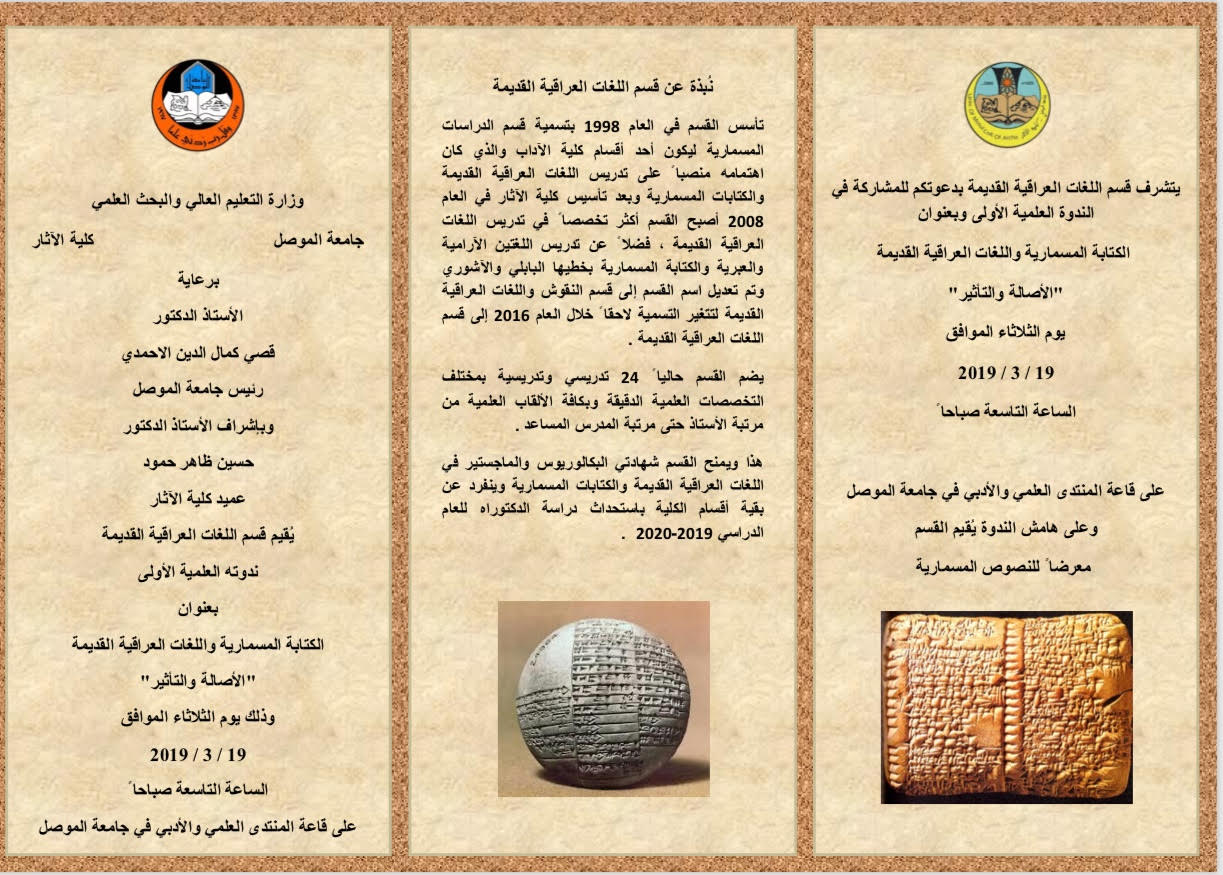
Cuneiform and the Indigenous Languages of Iraq: Now and Then
March 19, 2019 9:00 am - March 19, 2019 4:00 am
Arab States | Iraq | Mosul | College of archeology, Department of Indigenous Languages of Iraq
Conferences / Advisory
The First Scientific Symposium: Cuneiform And The
Indigenous Languages Of Iraq: Now And Then
In view of the exceptional circumstances that occurred
in Mosul 2014 -2017 that led to the destruction of the
archaeological sites in the city and the systematic
attacks against the multicultural and diversity of the
city that aimed to destroyed the the heritage of
indigenous citizens of Mosul. the Department of ancient
Iraq Languages at the University of Mosul is holding its
first scientific symposium on Tuesday, 19/3/2019 , at
the scientific forum hall at the University of Mosul
under the title: “Cuneiform And The Indigenous
Languages Of Iraq: Now And Then”
The committee has invited researchers from the Iraqi and
regional universities to participants in the symposium
where they wil discuss their papers focusing on the
themes, as follows:
the evolution of Cuneiform through the ages.
Sumerian language and literature.
Akkadian language and dialects.
The influence of cuneiform writing on the languages of
neighboring countries.
The conference is aiming to highlight the importance of
the ancient languages and its role in the local and
international intellectual discourse and knowledge. It
also aims to educate the Iraqi people about the history
of the indigenous people of Iraq and the importance of
protecting their heritage.
Today the people of Iraq speak at least four languages
from three major language groups: Arabic, Aramaic,
Kurdish and Turkman. Four thousand years ago, in 2000
BC, the same was true: Akkadian, Amorite, Hurrian and
Sumerian. Like modern Iraq, ancient Mesopotamia was a
composite and complex phenomenon, with all the tensions
and creative synergy that implies, and languages are one
of the principal identifying features of the different
groups making up the population. Not for nothing was the
Tower of Babel there! Our meeting concentrated on the
languages themselves, but it was with the common
awareness, whether expressed or not, that they are but
one facet of the entire civilization.
Language diversity naturally entails language contact.
In the courts of kings and the imperial capitals,
nationalities and languages rubbed shoulders. The
English word dragoman derives (rather tortuously) from
Akkadian targumannum, which described the interpreters
needed by the governments of four thousand years ago.
Even before this there were probably Meluhhans from the
Indus at the court of the Kings of Akkad, and there were
certainly Egyptians living at Nineveh in the 7th century
BC. A Babylonian correspondent of the Assyrian king
comments that “there are many tongues living in
the city of Nippur under the protection of the king my
lord”. The splendour of the Abbasid Caliphate drew
to Baghdad scholars from all over the Muslim world from
Cordoba to Bokhara.
One of the proud boasts of King Shulgi of Ur was that he
knew not only Sumerian but also Amorite and Elamite:
“Also I know the Amorite language as well as I do
Sumerian…… mountain people walking in the
hills ….., they greet me and I reply to them in
the Amorite language. Also I know the Elamite language
as well as I do Sumerian…… in Elam
…..,they greet me and I reply in Elamite”
(translation from ETCSL).
He was not shy about his talents, and in another passage
he claims to speak the language of the north, Subartu,
and says: “When I provide justice in the legal
cases of Sumer, I give answers in all five
languages”. One of Shulgi’s most famous
successors, Hammurapi, was less inclusive in his
attitudes, dismissing the people of Subartu, Gutium and
Tukrish as people “whose mountains are distant and
whose language is contorted” .
